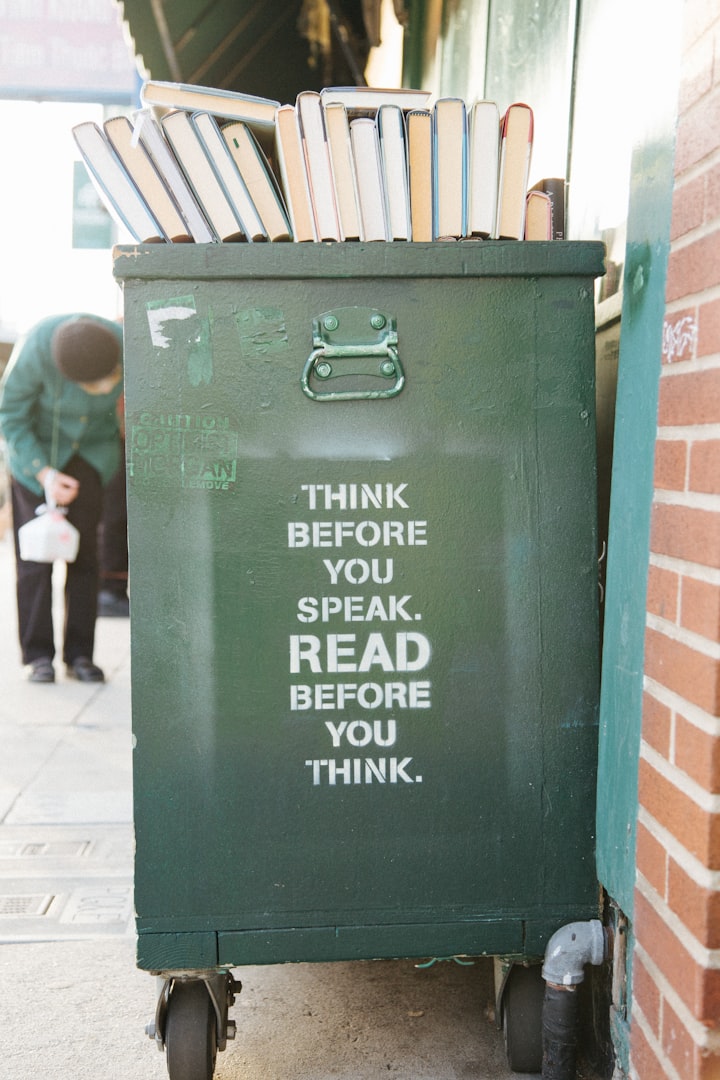Five Ways to Keep Your Sanity and Keep up with the 2020 Election
How to Stay Sane and Politically Engaged

lection stress is a real thing. People freak out, even explode in fury when they encounter another citizen who has a different political perspective than they do. Many choose to avoid talking about politics completely during these times because it’s so anxiety-rising for them.
It’s not acceptable in a democracy to just check out when the election comes around. We need the people to participate, take part, and engage for the system to work. If this is the case, why does it seem that everything we are given during an election causes our hearts to beat faster, our face to flush, and our stress levels to reach the point where the remote control is trembling in our hand?
I believe there is a pretty easy change of habits that we could employ to keep sane during the 2020 election. Most of our stress comes from what we consume as news about the election. As a teacher of communication, discourse, speech, and argument, I believe these changes will provide a healthier, stress-free way for you to engage the 2020 American national election.
Most stress and anxiety comes from a feeling of not being in control. I’m not a psychologist, but it seems that frustration with the government rises from seeing unjust, incorrect, or even plain stupid things being done by elected officials. We feel out of control, so we double down on the options in front of us that seem to give us control. These might not be the best ways to think and act politically, but they stifle the feeling of panic quickly and effectively. We quickly move to the candidate who is not the person we are so angry about we can’t even look at them on TV. But is this person the best candidate?
Rage, stress, and anxiety ruin our ability to critically process information. We need to gain a better sense, a better context, and better way to take in election cycle information if we hope to stay sane during the election. Here are some tips that might help you actually gain control of your critical thinking and your intellectual capabilities during a national election year.
1. Stop Watching Cable TV News Channels
The entire operation here is to create panic. Everything they present, every story they offer is equally important to the last story. How can there be breaking news all the time? It’s important to realize that what you see on these channels is crafted to maintain and increase viewership. Those numbers are vitally important to their revenue stream, advertising. But it’s not good for us. A constant sense of dread and panic as to what happened overnight or what will happen today interrupts your ability to critically think, question things in front of you, and most importantly to take a long-term view of things.
2. Read Long-Form Journalism

It’s important to read long form journalism such as what is offered in The London Review of Books, The New York Review of Books, The Atlantic, and political and cultural journals such as N+1 and Foreign Policy. Although you won’t agree with everything you read there, it is important because you will have the option to disagree. Most journalism, in particular non-print journalism, is constructed in a way to where the positions you can take on it are pre-ordained. These publications attempt to interrupt the cookie-cutter presentation of information in hopes to get you thinking independently, reconsidering the issue, instead of hoping you'll stamp their writing with a predetermined judgement and move on to the next article.
Predestination Journalism is reporting designed for you to be able to easily and quickly take a ready-made position in relation to what the article is reporting. This makes your encounter with the news as effortless and soothing as eating a bean burrito. It requires very little chewing, very little effort to get into it. It’s delicious, and probably not what you should be eating with any regularity. This journalism allows you to quickly choose a position in relation to a story then move to the next one and repeat. It’s a great model to get people to quickly consume a lot of content, look at a lot of ads, and then be primed for the next day – or hour – of content that will be delivered.
Contrast that to long-form journalism which is tough to get into, considers a very small (from our point of view) issue or idea, and goes deep. That one issue the journalist is taking on will have deep and surprising connections to the structures and superstructures of the world, politics, economics, or other ideas. It will help you arm yourself to approach news stories by giving you a greater sense of the history and the connections of what’s happening now to larger and older trends. It will prepare you to face the daily news cycle not in a sense of panic, but a sense of inquiry. Instead of the media articulating the stories, you can re-articulate them in the terms of what you know. And this is something that will keep you sane during the whole election show.
3. Leave America Behind Everyday

Foreign news sources, particularly political and economic analysis is valuable because it brings to your attention data sets and information that the American news media will ignore. Their job is not to inform you, but to inform you in a way that is profitable for them. Anything considered by news directors and producers as irrelevant, confusing, or boring gets the ax. Not so in foreign markets, where often there is at least one news organization that is run by a board of governors without a profit motive. You will get a very different set of information from these media sources around the world versus the American media.
But more importantly, you’ll get a very disorienting sense of the meaning of importance. There will be stories that will repeat endlessly on CNN that never get any attention from foreign media. What other countries feel is important is oriented by their worldview, not by America’s. And this can be a very liberating experience. You might feel yourself start to calm down, feel less panic, and understand the so-called “top story” in the light of the perspective from people around the world.
Additionally, cultural perspective teaches us what is important and not important. We learn this from an early age. Exposure to the writing and reporting of those who grew up in a different culture, religion, or place on the Earth will very quickly expose the truths and values underlying most of the mainstream American media. This can help you critically assess what you are being told, what you are hearing and what you are reading. This gives you more control through critical thinking, giving you an ability to find ways to question and reconsider the monolith of American news shot at you hourly.
4. Avoid the Presidential Debates

The Presidential debates could not be more irrelevant. They are controlled by party loyalists, they are structured to create confusion and doubt about the person you don’t like, and they do not contribute to anything a President would ever actually have to do in the job. They are a form of news media entertainment, and they create a real problem for our intellectual health.
Any President considering any problem has access to the world’s best analysts and thinkers, should they choose to consult them. There will never be a time where they have to give quick answers to huge issues facing humanity and the world. Why would this be a good determination if they should be President?
Is it a sign of intelligence to quickly and firmly respond in 2 minutes to questions such as “What is your plan to stabilize the economy?” or “What is your plan to combat terrorism?” Giving quick and simple answers to questions that could easily be a college course or someone’s doctoral dissertation is a sign of idiocy at best and insanity at worst.
The Presidential debates are not worth the stress, time, and cloudiness they will bring to your mind. Instead, do some reading into history about how Presidents encountered and handled the most difficult challenges they faced during their time and think about what methods you think are best.
More importantly, you could research America’s vast third-party candidates and see who is being left out of these partisan events. After you read about some of the third-party contenders, you’ll quickly realize why they were left out. The Presidential debates protect and preserve a very particular arrangement of power in the United States, and it’s not the power of the people. It’s the power of the corporate and vested interests that support both of the major parties.
5. Ask Questions Instead of Offering Opinions in Conversations about the Election

Sometimes we feel the intense pressure to express why we are right about a political candidate, and we get frustrated in conversation with others who don’t share that view. Our instinct is to launch into a speech about why that candidate is so amazing, awesome, or whatever. Unfortunately, these moments destroy conversation and become soliloquy without audience.
Conversation is at the heart of democracy, before any other value. The reason why is that democracy requires us to approach one another and try to get a majority opinion to do what we think is best. Long speeches, declarations of truth, or pushing facts and figures into the face of others is not conversation. Conversation requires much more listening than talking. It’s something we’ve forgotten, with the help of the cable news industry.
We feel empowered when we learn something and we want to share it with others. But the way we share it is as important as what we have discovered. We must take into account who we are sharing it with before we share, or the moment for their agreement or acceptance will be lost forever.
Rhetorical theory – from the ancient Athenians to today – teaches us that we must value the audience as much, or more than, the message. Without the audience, there’s no point to sharing what we think is right. We must learn what their principles, values, and motives are if we are to have any chance of getting our ideas across.
In this election, I encourage you to ask more questions in your political conversations. Figure out what they value, what they find important, what matters most to them. Figure out what they are reading or listening to. All this information will help you make your case in the best way possible. And if you don’t have the time in that encounter to fully persuade, you have set the stage for future encounters.
Once you see what is motivating their choice or position, you can now find handholds for the climb to the idea you want them to accept. This might be an unfamiliar approach, but it’s a lot less stressful than trying to talk over, interrupt, or “hold the floor” with friends and neighbors in political conversations. You can be relaxed, attending to the long-term perspective that at some point you’ll be able to connect your idea to their set of values.
You aren't going to accomplish what you want if you go around telling people what to think. Nobody likes to be told what to think. But people love to tell others what they think. They love even more the sense that they came up with an idea themselves. Let them do the hard work of convincing themselves. You participate by being relaxed, inquisitive, and interested in what they have constructed as their politics out of their life experiences.
These are just a few ideas to keep the election cycle stress free, but perhaps you have more. The most important principle I’d like you to take from this essay is this: You are the final say in what you believe. Use the same amount of care an caution you would with what you eat and drink with what you choose to read and watch for your election news. Your intellectual health depends on your ability to question and compare information, so don’t just eat one thing. Have a variety of sources, and a variety of media types. And most importantly, don’t panic. Take your time, and turn off the TV frequently. It will make you a better and more responsible political thinker.
About the Creator
Steve Llano
Professor of Rhetoric in New York city, writing about rhetoric, politics, and culture.
Enjoyed the story? Support the Creator.
Subscribe for free to receive all their stories in your feed. You could also pledge your support or give them a one-off tip, letting them know you appreciate their work.






Comments
There are no comments for this story
Be the first to respond and start the conversation.